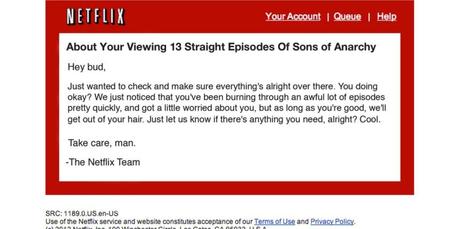Have you felt the shame of Netflix’s, “Are you still watching?” It’s the on-screen text you see if you watch two or more episodes of a TV show without ever pausing or in any other way giving any indication that you are in fact still there. The point is not to shame you, really. It’s more like an auto-off feature whereby Netflix preserves bandwith and stops streaming episodes of TV shows when it appears the people who turned them on have fallen asleep or left without hitting stop. However, its psychological impact on me is not dissimilar to the way I’d feel whenever my Nintendo Wii would use a load screen to put up an image suggesting maybe I should put down the controllers and get some physical activity outside. Wow. Even my video game console thinks I’m lazy. Maybe I should go for a run outside. Now with Netflix, it’s like, “Huh, even they think 10 straight episodes of Californication is a bit excessive.” All 7 seasons of the show were right there at my disposal, taunting me with, “Don’t you want to keep watching David Duchovny be an ass, suffer no consequences for his actions, and get laid more often than John Holmes?” I couldn’t stop, and as the Onion joked, maybe Netflix is worried about me:
 It turns out maybe we should all be worried about our Netflix habits. A new University of Texas study, titled “A Bad Habit For Your Health? An Exploration Of Psychological Factors For Binge-Watching Behavior,” suggests binge-watching is related to depression, loneliness, and generally unhealthy behaviors. The researchers asked 316 people ages 18-29 how often they watch TV; how often they had feelings of loneliness, depression and self-regulation deficiency; and how often they binge-watched TV. Not surprisingly, those people who indicated feeling lonely or depressed were more likely to binge watch, using the experience to escape their sadness. Moreover, this behavior was more prevalent among those with self-control issues. One of the paper’s authors Yoon Hi Sung stated a press release, “When binge-watching becomes rampant, viewers may start to neglect their work and their relationships with others. Even though people know they should not, they have difficulty resisting the desire to watch episodes continuously.”
It turns out maybe we should all be worried about our Netflix habits. A new University of Texas study, titled “A Bad Habit For Your Health? An Exploration Of Psychological Factors For Binge-Watching Behavior,” suggests binge-watching is related to depression, loneliness, and generally unhealthy behaviors. The researchers asked 316 people ages 18-29 how often they watch TV; how often they had feelings of loneliness, depression and self-regulation deficiency; and how often they binge-watched TV. Not surprisingly, those people who indicated feeling lonely or depressed were more likely to binge watch, using the experience to escape their sadness. Moreover, this behavior was more prevalent among those with self-control issues. One of the paper’s authors Yoon Hi Sung stated a press release, “When binge-watching becomes rampant, viewers may start to neglect their work and their relationships with others. Even though people know they should not, they have difficulty resisting the desire to watch episodes continuously.”
This is a very limited study. It’s solely specific to Millenialls, and they haven’t really established any causal relationship here (i.e., do you binge because you’re sad, or are you sad because you binge?). They won’t actually present the paper until the annual International Communication Association Conference in San Juan, Puerto Rico in May, at which point I hope they’ll reveal whether or not they collected enough data to be able to say something like, “Those respondents who indicated binge-watching x number of hours of TV were whatever percent more likely to also indicate feelings of depression and loneliness.” Also, did they use any kind of scale or test to gauge the level of depression and loneliness, or did they simply ask, “How often have you felt depressed?”
It turns out, though, that this study is notable because up until this point there has been very little empirical research on this topic even though binge-watching is not new. We’ve been doing it ever since the DVD box set became a thing.

At least we had to get up to change out DVDs. Netflix is more of a future humans in Wall-E kind of thing.
In some cases you can go even further back to people like my older brother who used to tape every Simpsons episode off of TV onto VHS tapes in the early 90s. We’d binge-watch the hell out of those things together. Now, we can just binge-watch every Simpsons ever on the FX Now app. As University of St. Thomas Communications professor Kevin Sauter told The Star, ”TV has always been accused of being a time-waster, and now we’re talking about big, big chunks of time. And time spent (binge viewing) means time taken away from other things, family, friends, activities.”
The binge-watching phenomenon is not exclusive to Netflix, but it is most closely associated with them. In an early 2013 report to investors, Netflix CEO Reed Hastings touted the streaming service’s strategy of releasing all episodes of a TV season at once thus encouraging bing-viewing, “Imagine if books were always released one chapter per week, and were only briefly available to read at 8pm on Thursday. And then someone flipped a switch, suddenly allowing people to enjoy an entire book, all at their own pace. That is the change we are bringing about. That is the future of television.” Hastings was attempting to help investors understand why Netflix was about to drop all of House of Cards on its customers instead of making them wait like normal TV. However, his devotion to the binge-watching model is not limited to TV shows. He thinks it will extend to the classroom, investing in companies which aim to provide “intelligent adaptive learning” technology for K-8 math students. He has spoken in support of the benefit of allowing students to binge-watch video lessons and lectures online. To him, binge-watching is not just the future of television; it’s also going to revolutionize education, though he concedes that last part will take time what with around half the planet still lacking interest access.
That’s big talk for a highly ambitious man. However, his pioneering of digital binge-watching on the TV side of things clearly has mental health professionals taking notice, and it feeds into concerns TV scholars have long since had about getting too much of a good thing too soon, with Professor Sauter explaining:
“The cultivation theory says that people who watch significantly more TV have a darker view of the world, they see it as a mean and scary place. This is a more focused experience—the binge. And yes, someone might be more concerned about going out into the community after three days of mayhem. But I don’t think it’s a permanent condition.”
So, people who binge may be covering up sadness in their life, and people who watch too much TV might find themselves more inclined to be too scared to venture out for fear of encountering some real life version of Dexter Morgan, one not quite so adherent to a “kill the guilty, spare the innocent” moral code.
It’s interesting, at this point, to note that Netflix CEO Hastings idea to prioritize binge over patience dates back to his college days. Last year, he told Vanity Fair’s New Establishment Summit, “My first binge was calculus. I got to college, I hadn’t had much calculus, and the college I went to had a self-paced program . . . I loved it. I could just go at my own pace, and it was a fantastic experience. It was tremendously engaging in the same way that binge entertainment is—you’re in control.” All Netflix (and Hulu, Amazon, etc.) does is allow us to watch TV at our own pace. We don’t have to obsessively consume the entirety of originals like BoJack Horseman or Orange is the New Black over a weekend just as we don’t really need to cram in older shows like Breaking Bad or Battlestar Galactica. Common sense would dictate that binge-watching TV shows (or even films, like if you want to spend an afternoon watching the good Original Cast Star Trek movies) is not the most productive use of one’s time, but it’s not inherently bad either if done in moderation, unlike this famous Portlandia sketch:
A Minneapolis college student told The Star, “I am a college student with two majors, I often had to read entire books overnight. With Netflix, I can easily translate my binge reading to binge viewing.” We’re busy people. Binge-watching helps fit entertainment into our busy schedules. Yada yada yada. So, it’s amazing how often I hear my friends discuss their binge-viewing habits with an undeniable tinge of shame, e.g., “I know it’s kind of sad, but I stayed up all night watching Friday Night Lights. It’s just so good!” or “I watched a lot of Arrow over the weekend, which is I guess the type of thing you do when you have nothing better to do” or “I felt like such a loser, but I just could not stop watching The 100 on Netflix” or “We’re going to watch the last season of Doctor Who together because she hasn’t seen it yet. A super exciting Saturday, right? Life of the party we are.”
What about you? Are you a habitual binge-watcher who sees nothing wrong with it? Or do you occasionally find yourself racked with thoughts like, “Have I really spent that long watching one TV show?” Or were you already feeling a little down, and now learning that apparently feeling down leads to binge-watching makes you feel even more down? Or are you just seething that I seemed to be so down on Californication in that first paragraph? Let me know in the comments.

